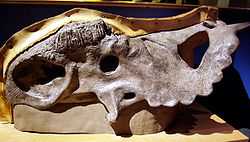Pachyrhinosaurini
| Pachyrhinosaurins Temporal range: Late Cretaceous, 84.9–66Ma | |
|---|---|
 | |
| Pachyrhinosaurus | |
| Scientific classification | |
| Kingdom: | Animalia |
| Phylum: | Chordata |
| Clade: | Dinosauria |
| Order: | †Ornithischia |
| Family: | †Ceratopsidae |
| Subfamily: | †Centrosaurinae |
| Tribe: | †Pachyrhinosaurini Fiorillo & Tykoski, 2012 |
| Type species | |
| Pachyrhinosaurus canadensis Sternberg, 1950 | |
| Subdivisions[1] | |
|
Xenoceratops | |
Pachyrhinosaurini was a subfamily of centrosaurine dinosaurs. The clade existed during the Late Cretaceous, about 84.9 to 66 million years ago, evolving during the earliest Campanian,[4] and becoming extinct in the latest Maastrichtian.[3][5]
Classification
Pachyrhinosaurini was defined in 2012 by Fiorillo & Tykoski. It was defined as "all centrosaurine ceratopsids more closely related to Pacyrhinosaurus canadensis than to Centrosaurus apertus. It was defined during the description of Pachyrhinosaurus petorum, a species from Alaska[3]
Below is a cladogram by Sampson et al. 2013,[1] with clade names such a Pachyrhinosaurini as defined by Fiorillo and Tykoski (2012).[3]
| |
| |||||||||||||||||||||||||||||||||||||||||||||||||||||||||||||||||||||||||||||||||||||||||||||||||||||||||||||||||||||||||||
| |
References
- ↑ 1.0 1.1 Sampson, S.D.; Lund, E.K.; Loewen, M.A.; Farke, A.A. & Clayton, K.E. (2013). "A remarkable short-snouted horned dinosaur from the Late Cretaceous (late Campanian) of southern Laramidia". Proceedings of the Royal Society B. 1766 280: 4. doi:10.1098/rspb.2013.1186.
- ↑ Ryan, M.J.; Evans, D.C.; Shepherd, K.M. & Sues, H. (2012). "A new ceratopsid from the Foremost Formation (middle Campanian) of Alberta". Canadian Journal of Earth Sciences 49 (10): 1251. doi:10.1139/e2012-056.
- ↑ 3.0 3.1 3.2 3.3 Fiorillo, A.R. & Tykoski, R.S. (2012). "A new Maastrichtian species of the centrosaurine ceratopsid Pachyrhinosaurus from the North Slope of Alaska". Acta Palaeontologica Polonica 57 (3): 561. doi:10.4202/app.2011.0033.
- ↑ Gilmore, C.W. (1930). "On dinosaurian reptiles from the Two Medicine Formation of Montana". Proceedings of the United States National Museum 77 (16): 1–39. doi:10.5479/si.00963801.77-2839.1.
- ↑ Fiorillo, A.R. & Gangloff, R.A. (2001). "Theropod teeth from the Prince Creek Formation (Cretaceous) of northern Alaska, with speculations on Arctic dinosaur paleoecology". Journal of Vertebrate Paleontology 20 (4): 675–682. doi:10.1671/0272-4634(2000)020[0675:TTFTPC]2.0.CO;2.